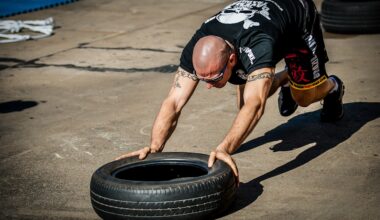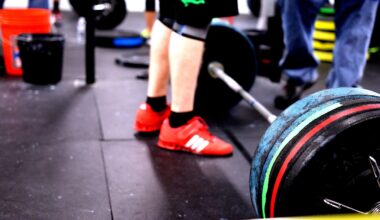The Role of Self-Regulation in Sport and Exercise
Self-regulation plays a crucial role in the context of sport and exercise, facilitating an athlete’s ability to set achievable goals and monitor their progress. It involves the capacity to control one’s behaviors, emotions, and motivation to achieve desired outcomes. Athletes with strong self-regulation can maintain focus and commitment, particularly during challenging times. This personal discipline enables individuals to remain committed to their training schedules and push through obstacles that may arise. For instance, an athlete may experience fatigue or setbacks, yet harnessing their self-regulation skills helps them persist in their efforts. At its core, self-regulation consists of setting specific goals and employing effective strategies to reach them. Individuals need to assess their thoughts and behaviors critically, ensuring that they align with their ultimate objectives. Research has shown that self-regulation can significantly enhance performance levels in various sports disciplines. Athletes can calibrate their psychological state through effective self-regulation practices, ultimately leading to better results. Through consistent effort, individuals develop resilience, which plays an essential role in achieving long-term success in sports.
Coaching strategies often emphasize the importance of enhancing self-regulation among athletes as an essential component of enhancing performance. Coaches can play an influential role in guiding athletes toward developing these skills. Strategies may include goal-setting sessions, reflection practices, and regular feedback cycles. By fostering an environment that encourages self-assessment and personal development, coaches empower athletes to take ownership of their journeys. Through such support, athletes learn to navigate various challenges effectively, utilizing self-regulation techniques to optimize their training routines. Additionally, education on mental skills can further promote effective self-regulation. Techniques like visualization and mindfulness can bolster athletes’ focus and concentration, further enhancing their self-regulatory capacities. When athletes can visualize success and maintain mindfulness during training, they tend to perform better under pressure. Moreover, understanding the process of self-regulation enables athletes to adapt their strategies based on specific situations. They can adjust their goals and expectations realistically, improving their overall adaptability. Consequently, fostering self-regulation not only aids individual athletes but also contributes to heightened team dynamics, allowing athletes to support each other on their journeys.
Understanding Motivational Theories
Motivational theories provide valuable insights into the psychological mechanisms underlying self-regulation in sport and exercise. Among these theories, the Self-Determination Theory (SDT) stands out as a significant framework. SDT posits that people are motivated when their needs for autonomy, competence, and relatedness are met. For athletes, nurturing these needs fosters intrinsic motivation, leading to improved self-regulation. When individuals feel competent and autonomous in their training, they are more likely to persist. Furthermore, goal-setting theories highlight the importance of setting specific, measurable, achievable, relevant, and time-bound (SMART) goals. Such structured goals promote self-regulation by providing clear directions for athletes to follow. Additionally, the achievement goal theory emphasizes the role of achievement orientations, distinguishing between mastery and performance goals. Athletes with mastery goals focus on self-improvement and personal bests, leading them to develop more effective self-regulation strategies. In this context, understanding motivational theories can assist athletes in recognizing their driving forces, enabling them to self-regulate more effectively and adopt a proactive mindset.
Moreover, the role of feedback in self-regulation cannot be understated. Feedback serves as an essential mechanism for athletes to assess their performance and adjust their strategies accordingly. Positive reinforcement encourages continued effort, while constructive criticism allows individuals to identify areas for improvement. Athletes can utilize feedback to boost their self-efficacy, impacting their motivation and self-regulation. Ultimately, consistent feedback helps athletes remain aware of their progress, facilitating informed adjustments to their goals. With regular feedback, athletes learn to navigate through setbacks and remain resilient, adjusting their self-regulation strategies in response to challenges. Additionally, social support from coaches, teammates, and trainers significantly impacts an athlete’s self-regulation abilities. Feeling supported can enhance motivation and self-regulation, enabling athletes to navigate both successes and failures effectively. This supportive network contributes to building confidence, creating a positive environment for growth. Ultimately, self-regulation is a dynamic process influenced by both internal and external factors, with social support playing a crucial role in fostering an athlete’s ability to self-regulate effectively.
Implementing Self-Regulation Strategies
Implementing self-regulation strategies is essential for both novice and experienced athletes looking to improve their performance. The process begins with establishing clear and achievable goals, which serve as a foundation for individual progress. Athletes should identify their long-term aspirations and break them down into smaller, actionable steps to facilitate their journey. This process lays the groundwork for self-monitoring, allowing athletes to track their progress. Practical strategies such as journaling can enhance self-awareness and provide insights into personal performance patterns. Furthermore, athletes can benefit from visualization techniques, imagining themselves achieving their goals successfully. These mental rehearsals facilitate a stronger connection between their physical and psychological states. Establishing a structured routine is another effective way to bolster self-regulation. Consistency helps athletes develop discipline, allowing them to maintain their focus effectively. Incorporating recovery practices into training routines drastically improves overall performance and supports recovery, reinforcing self-regulation principles. Lastly, enhancing self-regulation necessitates continual practice and patience, making a commitment to personal growth essential in any athlete’s training.
Additionally, overcoming obstacles during the training process is an inevitable reality for many athletes. Recognizing potential barriers, such as physical limitations or external pressures, is vital for developing effective self-regulation strategies. Athletes need to anticipate obstacles and implement coping techniques to manage these challenges effectively. For instance, problem-solving skills allow individuals to explore alternative pathways when faced with adversity. Setting realistic expectations plays a crucial role in maintaining motivation and effective self-regulatory practices. By calibrating their ambitions, athletes can evade feelings of frustration, enhancing their overall experience in sport. Moreover, building mental resilience is intrinsic to developing effective self-regulation. Athletes can cultivate mental toughness by progressively challenging themselves through various training regimens, reinforcing their importance in sports. Additionally, engaging in deliberate practice within their disciplines allows athletes to identify strengths and weaknesses, paving the way for targeted improvements. Ultimately, cultivating self-regulation requires adaptability and persistence in navigating challenges throughout an athlete’s career.
The Future of Self-Regulation in Sports
The future of self-regulation in sports looks promising as advancements in technology continue to shape the landscape of athlete training and development. Wearable fitness devices and mobile applications provide athletes with personalized data and insights, allowing them to refine their self-regulation strategies. By tracking progress in real-time, athletes can make data-driven decisions to adapt their training regimens effectively. Furthermore, the integration of virtual reality into sports training allows athletes to simulate competition environments, enhancing their mental preparation and self-regulation skills. As new methodologies evolve, the importance of psychological skills training will sharpen, addressing an athlete’s mental state alongside their physical training. Research will further elaborate on the need for individual differences in self-regulation, tailoring strategies and interventions to suit varying personalities and learning preferences. Consequently, fostering self-regulation will become progressively essential for athletes at all levels. Equipping athletes with the necessary tools for self-regulation prepares them for the inevitable challenges faced during their careers, facilitating both personal and professional growth in their sporting journeys.
In summary, self-regulation represents a vital factor that contributes to achieving success in sport and exercise. By emphasizing its significance through motivational theories, athletes can harness the power of self-regulation to elevate their performance levels. The interaction between psychological insights, effective coaching, and personal commitment shapes an athlete’s capacity to self-regulate. Utilizing various strategies like goal setting, feedback, and mental training techniques enables individuals to develop crucial self-regulatory skills. Importantly, overcoming obstacles and building resilience paves the way for athletes to persist toward their aspirations. Moreover, the continuous evolution of technology and research will enhance understanding and implementation of self-regulation strategies, promoting a future where athletes can thrive. As self-regulation takes center stage, athletes will increasingly recognize its influence on their overall performance, mental well-being, and satisfaction in their engaging experiences. Ultimately, the journey of cultivating self-regulation becomes an enriching part of an athlete’s development, creating thriving conditions for both personal and competitive growth. This holistic approach to training emphasizes not only the physical aspects of sport but also underscores the importance of mastering one’s mental landscape.


